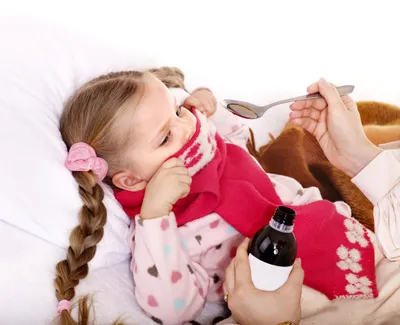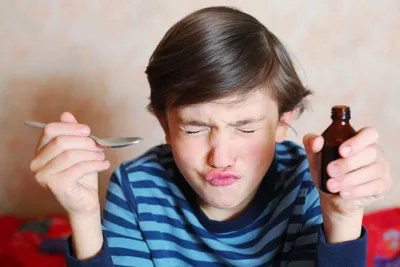When it comes to coaxing your child to take their required medication, it can be a bitter pill to swallow. They may put up a huge struggle, making the process a lot more difficult than it needs to be.
However, with the right approach, you can make administering eyedrops or getting some elixir down their throats easier for everyone, while ensuring your child is getting the medicine they need to recover properly. Here are seven tips to help the medicine go down…
1. Come At It Positively
EveryDayHealth.com notes that kids can read you like a book – so if you approach them with a medicine bottle and a somber look on your face, it might put them into resistance mode. When it comes to older kids, “reason and encouragement” are key, notes the source. Explain to them why they need the medicine – give them the benefits.
The challenge can be greater for younger kids, who will “take cues from a parent’s emotions,” it adds. In short, the more frustration you show, the more resistance you’ll encounter.
2. Appeal to Their Tastes
Let’s face it, some medicines taste like… well, yeah. So if you have to plug your nose to get medicine down, imagine how a kid will react to bitter pills or liquids. Parents.com suggests you “disguise the taste” by using added flavors (available from a pharmacist) such as chocolate or root beer.
It doesn’t even have to be prescription medications – over-the-counter drugs can be flavored by your pharmacist as well, adds the source. For example, you can change the cherry taste of a cough medicine to banana flavor if your child prefers, explains the source.
3. Bypass Their Tastebuds
Instead of changing the flavor to their liking, you can actually just skip their tastebuds altogether, suggests EveryDayHealth. You can do this by using a syringe to suck up the medicine, and then placing it at the back or side of the tongue where the tastebuds won’t absorb it, notes the source.
The site warns that you should ensure your child is in an upright position when administering medicine in this fashion, to avoid gagging or choking. It adds that lightly blowing on their face after you’ve dropped in the medicine will coax them to swallow it before they have a chance to spit it out.
4. Let Them Have Some Control
Your responsible adult brain is screaming at you to make sure your child gets their medicine, which makes you want to take control of the situation and administer it despite their resistance. However, BabyCenter.com suggests trying the opposite approach for a change.
Suggestions from parents on the site include letting your child give you a “pretend dose” in a syringe (perhaps yours could be filled with water or juice). After that, you can give them their (real) dose. Another sources suggest letting your kids choose the flavor, or doing some fun role-play that lets them give their stuffed animals some medicine first.
5. Hide it In Their Food
This may be one of the older tricks in the book, but it’s still an effective one. If your child is taking medicine in pill or capsule form, “in most cases” it’s safe to crush the pill/open the capsule and add the contents to their meal.
However, EveryDayHealth.com said some time-released medications could be altered if you crush or open them (consult your doctor or pharmacist for advice). You’ll also have to make sure your child eats the entire meal to get the full medication dose, so make sure it’s one of their favorites. (Getting them to eat is another post altogether.)
6. Use Bribery
Okay, so this is maybe not your proudest moments as parents, but sometimes if you’re tired or pressed for time and the little one still needs to take their medicine, you can try a little bartering.
Tell them that they’ll get a cookie or another small treat if they get their medicine down. It doesn’t have to be an edible treat, adds WhatToExpect.com – you can also give them a little toy or trinket or even a sticker that will probably go a long way. Just be careful how often you use this tactic – you don’t want your kid expecting a reward for everything they do.
7. Wait Until They’re Asleep
This one applies to eye drops in particular, which can be a particular challenge because you can’t just make them taste like candy. Today’s Parent suggests waiting until they’ve fallen into a slumber to do the dirty work (after you’ve failed at the other methods during the waking hours).









